|
February 21, 2019
What It
Means to
Be "Open for Business"
Workers
Reject the
Ruling Elite's Politics
of Being "Open for Business"
PDF
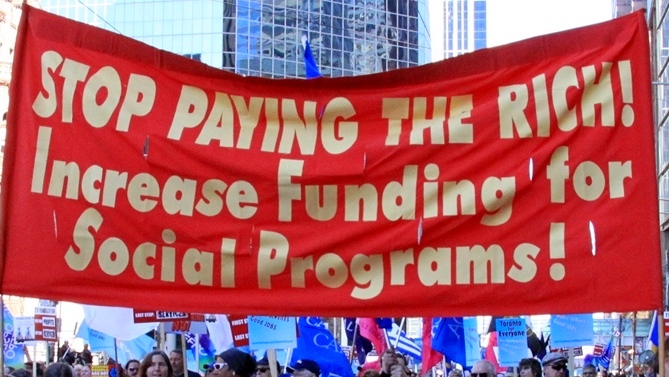
•
Destruction of Manufacturing
Continues in Ontario
Lockout at
Aluminerie
de
Bécancour
Inc.
• Support
for ABI Workers Continues as Alcoa/Rio Tinto Cartel Abruptly
Breaks off Negotiations
Municipal
Workers in
Quebec Stand Up for their Rights and Dignity
• Public Sector Employers Create
Impasse for
Workers
Interview
• Maintenance Workers at Montreal
Transit
Corporation Demand a Negotiated Contract Which Is Acceptable to
Them
- Gleason Frenette, President,
Montreal Transit Union (STM-CSN)
Defending the
Rights
of Migrant Workers
• National Day of Action Calls for
Health Care
for All
Condemn Canada's
Support for U.S.-Backed Coup in Venezuela
• Statement - Canadian Union
of Postal
Workers
What It Means to Be "Open for
Business"
 Representatives of
the
monopolies and governments in their service promote the slogan
"open
for business" as the sine qua non guide for all economic
activity. It was introduced by Mike Harris in Ontario in the mid
nineties and is now the mantra of the Ford government in Ontario
of the
Legault government in Quebec. Workers reject the outlook,
politics and
practices underlying
such a slogan. Representatives of
the
monopolies and governments in their service promote the slogan
"open
for business" as the sine qua non guide for all economic
activity. It was introduced by Mike Harris in Ontario in the mid
nineties and is now the mantra of the Ford government in Ontario
of the
Legault government in Quebec. Workers reject the outlook,
politics and
practices underlying
such a slogan.
The notion of being open for business begins from
the
false premise that businesses are the creators of social wealth.
In the
socialized economy, the collective act of workers, working on
means of
production other workers have already produced, creates all
social
wealth.
Although workers neither control nor own the
social
wealth they create, the truth cannot be denied that they are the
creators of it. Social wealth is expropriated by huge private
interests
that possess immense means of production workers have produced,
on
which the economy, people and society depend. To declare big
private
interests the
creators of wealth for whom economies and societies should be
"open for
business" and should serve their narrow interests is not only
unscientific and false but ludicrous and irrational.
At the present time, the world is witnessing an
unprecedented destruction of the social wealth of human
collective work
in the form of famines, the displacement of entire populations,
the
destruction of regional and national economies, wars to destroy
what
the imperialists cannot control, and other calamities.
Just recently in Ontario, the sudden announcement
of
the illegal closure of the Oshawa GM plant reveals to all that
those
who created the social wealth in the form of means of production
are
not those bent on destroying what workers created. The destroyers
are
those same investors for whom the politics of "open for business"
suits
their narrow private interests but generates havoc in the lives
of
working people and the economy.
The irrational slogan mystifies the reality of
the
socialized economy in hopes of keeping the working class in a
subordinate position, incapable of fulfilling its mission of
defending
the rights and well-being of all and providing those rights with
a
guarantee through setting a new direction for the economy under
the
control of working people and their allies.
"Open for business" signifies a multiplication of
pay-the-rich schemes. Swaths of social wealth are poured into the
coffers of the rich and squandered at their whim. Here too the
people
have witnessed the outcome. Billions of dollars of public funds
were
paid to GM in Canada and the United States in 2009. Now a brutal
closure not only deprives thousands of workers of their
livelihood at
the Oshawa plant and its supplier network of other facilities,
but will
greatly damage the interconnected local economy. The huge sums of
social wealth in the form of public funds paid to GM are no
longer
available to the society but have been absconded with by those
same
private interests so keen on the economy being open for business.
What
takes place could more properly be described as "open for
plunder." The public social wealth lost in the global
machinations of
GM, and the private social wealth in the fixed social wealth of
means
of production in southern Ontario are being denied to the economy
and
people to move life forward in ways that would ensure the rights,
security and well-being of all. This must not pass!
 Proponents of the
"open for
business" politics exhibit a mortal hatred towards any regulation
of a
prescriptive nature, any state arrangement that provides a
measure of
health, safety or work standards to workers. For example, the
Ford
government in Ontario passed a law, in its mania to make Ontario
"open
for business," which weakens Ontario's minimum labour standards,
notably with regard to hours of work and pay. Further, it wants
to pass
legislation to de-unionize construction work in public
institutions,
thereby forcing those who work in construction in those sectors
to work
without the protection of a union or a collective agreement. Proponents of the
"open for
business" politics exhibit a mortal hatred towards any regulation
of a
prescriptive nature, any state arrangement that provides a
measure of
health, safety or work standards to workers. For example, the
Ford
government in Ontario passed a law, in its mania to make Ontario
"open
for business," which weakens Ontario's minimum labour standards,
notably with regard to hours of work and pay. Further, it wants
to pass
legislation to de-unionize construction work in public
institutions,
thereby forcing those who work in construction in those sectors
to work
without the protection of a union or a collective agreement.
Elsewhere, successive Liberal and Conservative
federal
governments have deregulated the rail industry, under the slogan
that
companies are the ones that know their businesses best. This
abandonment of the public authority has led to tragedies, one of
which
happened on February 4, with the tragic deaths of three CP
railway
workers whose
train plunged into the Kicking Horse River. Workers reject with
contempt the fact that, in the name of being "open to business,"
they
and their communities are being delivered to chaos and
insecurity.
Hidden behind the slogan "open for business," is
the
ruthless desire of rich oligarchs and their governments to
deprive
workers of the means to organize collectively and legally in
defence of
their rights and the rights of all. The politics of "open for
business"
is meant to criminalize the struggles of workers for their
rights.
Truth is turned on its
head, with workers portrayed as enemies of the economy and the
production of social wealth. Workers are looked upon as intent on
keeping certain "privileges" obtained as a result of being an
organized
collective force. Those "privileges" and collectives must be
dismantled, cry the oligarchs and their governments, so that
everyone
is placed at the
mercy of the reckless adventures of the rich in the service of
their
private profit and empire building.
Workers have not waged their mass struggles in
defence
of their rights and to move society forward only to accept a
repugnant
slogan and politics that repudiate all that they have fought for
in the
past and aspire for in the future. Workers are not opposed to
business being done, so long as it contributes to the well-being
of
all, with production
based on modern standards approved by the workers themselves and
defended by a public authority under their control.


Workers rally outside Erwin Hymer plant in Cambridge demanding
answers,
February 19, 2019.
Those presently in control of the Erwin Hymer
Group
North America, headquartered in Cambridge, Ontario advised on
February 15 that the company was going into receivership and
closing its operations that very day, throwing close to 900
workers in the Kitchener-Waterloo region out of work,
including 850
workers at its Cambridge plant. As if that shocking statement was
not
enough, workers were further informed that they would be paid
their
last week's wages and any vacation pay but no severance pay. Such
is
the socially irresponsible and brutal nature of today's relations
of
production between the Canadian working class and the global
financial
oligarchy.
Workers at plants in Cambridge and Kitchener have
been manufacturing recreational vehicles (RVs) since 1974.
The
plants were locally owned and operated under the Roadtrek brand
until 2011 when, unable to recover from the 2009
recession,
the owners sold the enterprise to a U.S. investment firm,
Industrial
Opportunity Partners. The chaos and insecurity for the workers
did not
end, as the new owners flipped part of the enterprise to other
oligarchs, leaving the business in the hands of Germany-based
Erwin
Hymer Group North America in 2016.
The crisis-ridden system did not stop there, as
the
Hymer Group itself soon faced a takeover by U.S.-based Thor
Industries.
The oligarchs completed a purchase deal on January 31,
resulting
in yet another ownership group, U.S.-based Corner Flag, seizing
control. However, the two plants in Ontario were left out of the
deal
and went into
receivership on February 15, shutting down without warning.
Some
of the employees have been with the company for 30
to 40
years. The shops were non-unionized. The financial firm Alvarez
&
Marsal Canada Inc. has been appointed receiver of the
company.
No political authority either federal or
provincial has
lifted a finger to intervene in the situation and defend Canadian
workers or the economy throughout the ordeal. On the contrary
Premier
Doug Ford has declared Ontario open for business giving the
financial
oligarchy carte blanche
to do
whatever serves its narrow interests.
The turmoil at and eventual closure of the Erwin
Hymer
Group North America RV plants after years of being flipped by
foreign
investment firms is yet another example that the economy needs a
new
direction that favours and serves the working people and Canadian
economy.

Lockout at Aluminerie de
Bécancour
Inc
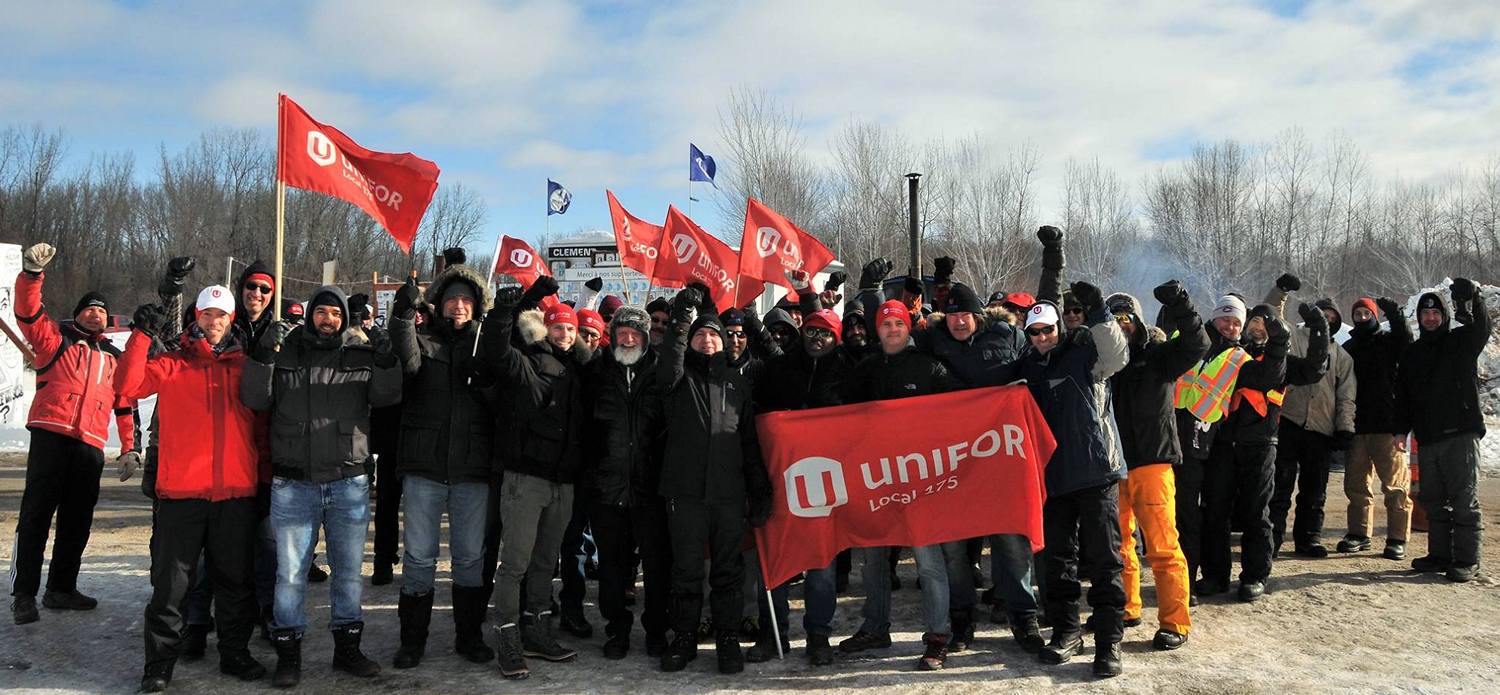
Unifor Local 175 workers from Suncor in Montreal visit locked out
workers at ABI in Bécancour, February 19, 2019. (M. Bedard)
Support for the locked out workers at ABI
continues as
the
owners abruptly halted negotiations on February 15. A round of
negotiations began on January 31, but the company representatives
walked away without a word of explanation other than to say they
wanted to "think" and would give news whenever they had something
to say.
Workers are extremely angry at this arrogance and
contempt for the workers, who have been locked out for no reason
for
more than 13 months, with the region as well suffering from the
effects
of the lockout. Alcoa/Rio Tinto demands all kinds of
hydroelectric and
other privileges for their presence in Quebec, but they do not
recognize any social responsibility to the workers who create the
value
that they covet, or to the local community and society.
Workers across Quebec find the ABI lockout
contemptible
and
senseless. In response to the irresponsible dictate of the
owners, workers are increasing their support for ABI smelter
workers and their community. Workers throughout Quebec are coming
to visit ABI workers on their picket line and also receive and
welcome them in their areas to learn more about the conflict and
express their support.
Workers who have been locked-out themselves, or
live in
a region that has experienced one, make a point of assisting the
ABI
workers. A delegation from Unifor Local 175, which represents 260
workers at the Suncor refinery in Montreal, visited the
locked-out
workers on February 19. Suncor refinery workers themselves were
locked
out for 14 months in 2007/2008 and know from experience how the
mobilization of all workers is important to wage these battles.
They
were accompanied by union presidents from other refineries
including
the giant Valero refinery in Lévis.
The 73 union members represented by United
Steelworkers
Local 9190 who work for the Roberval-Saguenay Railroad on
February 15
unanimously renewed their recurring contribution of $10 per week
per
worker for an additional six months. In one year, the railway
workers
sent a total of $38,700 to Bécancour.
USW Local 9190 President Daniel Girard, from the
Rio
Tinto Alma plant said, "It's a war effort that everyone is doing
together. Rio Tinto owns 25 per cent of ABI. We have the same
employer
and we operate in the same type of industrial environment. In
2012,
there was a lockout in the area, in Alma, and in 2015, we faced
some
provocations in our bargaining and we are going back to
negotiating in
2020. We want to send a message to these big companies: when they
are
fighting against the workers they are fighting against all
workers at
the same time, not just one group."
Recently, the Unifor Youth Committee, together
with
members of
the Bibby Ste-Croix Foundry Workers Union affiliated with the
Federation of Manufacturing Industries (CSN), invited a
delegation
of ABI workers to speak to their members.
ABI workers are holding a general membership
meeting on
Saturday, February 23, to assess the situation.

Municipal Workers in Quebec Stand
Up for
Their Rights and Dignity

Protest by Montreal Transit maintenance workers, September 13,
2018.
Municipal employees are waging a brave fight
against
the untenable situation in which the Quebec government and some
municipal employers seek to place them. Workers face a concerted
attack
on their right to negotiate their terms of employment to obtain
conditions that are acceptable to them, without threat, without
criminalization and
without arbitrary laws that dictate and aggravate their working
and
living conditions and deny them their rights.
A prominent example is the maintenance workers of
the
Montreal Transit Corporation (STM) who play a very important role
in
public safety by maintaining buses and subway cars. (See interview
below with the President of the union). In their current
negotiations
for a new collective agreement, they face an impasse created by
the
Quebec
government, the Montreal Transit Corporation, and the
Administrative
Labour Tribunal.
The workers are subject to two laws, one that
virtually
eliminates their right to negotiate the terms of their pension
plan,
and the other that allows a governmental decree of their terms of
employment if it considers that negotiations are not proceeding
to its
liking. This threat of dictate has been combined during
negotiations
with the arbitrary
dismissal and other disciplinary measures against workers. As
well, the
Labour Tribunal is prosecuting workers under false accusations of
sabotage of maintenance and the use of illegal methods to
pressure
management.
In this context, the Montreal Transit Corporation
has
announced a "global and final offer" after two years of
negotiations,
blaming the workers for the fact that no collective agreement has
yet
been signed. The workers are asking: what is the meaning of this
so-called global and threatening final offer? Is the
transportation
company preparing to
ask the government to step in and dictate a collective agreement,
if
the workers do not accept this "global and final offer"?
Workers are entitled to ask, discuss and question
publicly, openly and collectively the situation they are facing.
How
can this two year ordeal end either with an unacceptable "global
and
final offer" or a government decree and yet be considered fair
collective bargaining? What is the legal space left for them to
present
demands and concerns
they consider important to themselves and the service, and find
some
acceptable arrangement?
Workers
do
not
find it acceptable that governments, which declare themselves
democratic, violate with impunity the rights of municipal workers
to
negotiate their working conditions, wages and pensions. Equally
unacceptable is the elimination of negotiations, or what used to
be
called fair collective bargaining, under the veneer of high
ideals. The
workers' right to a say over what they receive in exchange for
their
capacity to work, and over their working conditions, belongs to
them as
a matter of right. In the case of STM workers, their working
conditions
are directly related to providing a level of public services the
people
and society need and expect.
STM
workers
are
not the only ones in this untenable situation. Municipal
employees across Quebec have lost significant amounts of money,
sometimes more than $10,000 for a single worker, because of the
pension
law that forced workers to cover deficits in pension funds, even
when workers had always put in the amounts required under their
collective agreement but employers did not. Several municipal
governments failed to contribute the required amounts and
diverted
money to other areas with government approval. This can only be
called
theft of what belongs to workers by right, legally negotiated in
exchange for their capacity to work. Not only is this ongoing
theft
very large, the legal space for negotiating an end to these
anti-worker
practices has been virtually eliminated.
The attacks against the municipal workers also
pave the
way to further privatization of municipal services under
imperialist
free trade agreements such as the Comprehensive Economic and
Trade
Agreement (CETA) between Canada and the European Union of the
monopolies, and the replacement of NAFTA, the United
States-Mexico-Canada Agreement (USMCA). These supranational
monopoly-controlled trade
agreements lessen local control over the economy, drive down
workers'
claims on the value they produce, allow private enterprise to
expropriate the added-value municipal workers create, and open
the door
for higher user fees and government subsidies to the monopolies
that
own and control public services and infrastructure both now and
in the
future.
Workers' Forum stands firmly with the
municipal
workers in Quebec and Canada who are persisting in their just
struggle
in defence of their rights and the public services they provide.
The
refusal of the ruling elite to recognize the rights of the
working
class to a say and control over its terms of employment is not
"free
collective
bargaining" but a denial of workers' rights. For the working
class,
freedom lies in the recognition of the necessity for change in a
manner
which deprives the ruling elite of their power to deprive workers
of
the power to affirm rights.

Interview
- Gleason Frenette, President,
Montreal
Transit Union (STM-CSN) -

Gleason Frenette, speaking at May 3, 2018
Montreal Transitworkers
rally.
|
Workers' Forum: How many workers
are
involved in current negotiations and what work do they do at the
Montreal Transit Corporation (STM)?
Gleason Frenette: The union
represents about 2,400 members. The majority, about
three-quarters, are tradespeople, electricians, plumbers, masons,
tinsmiths, etc., and about 550 maintenance workers. The
collective
agreement expired last January 2018; we started negotiations
eight
months before the end of
the agreement. We've now been negotiating for 22 months.
WF: What are the main features of
this negotiation?
GF: The STM came to us with more
than a hundred rollbacks in its offer. Those were demands for
major
changes in several aspects of the collective agreement including
working hours. It is not customary to ask for so many changes in
the
negotiations. Normally the employer tries to change some aspects
of the
agreement
by giving something else in exchange.
They came with all these requests, probably
thinking
that with Bill 24, in the event that we cannot reach an
agreement, the government would decree our working
conditions.[1] They asked that our working hours
be
based on twelve-hour shifts, instead of eight hours as is the
case at
present.
They want more employees to work on weekends and on evening and
night
shifts. They call this operational flexibility. They pushed us
into a
situation where if we manage to make some gains and undo the
majority
of their requests for setbacks the members will be satisfied. Our
main
demand is to maintain what we already have.
We also have a demand with respect to the pension
plan.
We are asking for compensation in connection with Bill 15,
which
forces us to contribute three per cent more to the pension
plan.[2] Under Bill 15, our members
have to
contribute three per cent more to the plan and the employer
three per cent less. We had to divide the pension plan into two
components, a component before Bill 15 and one after, as the
new
law requires the parties to contribute 50-50 in the pension
plan.
Before the law was passed, we were contributing
six per
cent of our payroll to our pension plan and the employer was
doubling
it. We called it a 12-6 contribution. We had negotiated all
that.
It was stipulated in our contract. We had made concessions in the
past
to receive this 12-6 ratio; we had accepted zero per cent
wage
increases to keep that rate in our pension plan. With
Bill 15, the
government made it possible to undo this aspect of the collective
agreement. We are now asking for wage compensation for the
increase in
our dues.
WF: Can you explain how
Bill 24
affects your negotiations?
GF: Bill 24 provides that
under
certain conditions, if we cannot reach an agreement, the
government
could ultimately decree our working conditions. We have been in
mediation since September 2018. We had two extensions
of 60
days of mediation, as the law provides. The second extension
period
ended
on January 12. If the mediator wants to extend the mediation
again, according to the law, the employer and the union must
agree. At
the moment, the employer is tolerating the presence of the
mediator. If
he wishes, he may request the appointment of a special mandatary,
which
would be the next step. Negotiations would continue during
that time, but the special mandatary would prepare his report for
the
government, and the government could decree the collective
agreement
according to the advice of the mandatary.
WF: Where are the negotiations at
the moment?
GF: On the issue of flexibility,
we
have accepted many of their schedule changes but not all of their
demands. On the other hand, we are asking for a wage increase
to obtain the wage catch-up for tradespeople, something we have
been demanding for many years. The wages of many of our trades
are
lagging behind those in the private sector and comparable
sectors. We
want
an overall wage increase that allows us at least to maintain our
purchasing power.
In addition, we are awaiting, as I speak to you,
a
decision of the Administrative Labour Tribunal. The employer
accuses us
of taking illegal job actions that disrupt service to the public,
for
example by reducing the availability of buses on the road. We
reject this accusation; we have not engaged in any illegal job
actions.
We are saying
that it is bad management decisions that have damaged the
service. They
made a lot of bad decisions with respect to bus maintenance. The
employer is the only one to blame for the inadequate services to
the
public.
This situation of bargaining has been going on
for two
years now. Meanwhile, our daily life continues; we do not just
have to
deal with bargaining; we have members who are being fired; we
have
members who have workplace accidents and have to go on salary
insurance.
Dismissals are on the rise, and these are largely
punitive dismissals, that are intended to scare us. They attack
those
who stand up to them on anything. They actually fired one worker
and
suspended another worker for six months for confronting a STM
director
who physically attacked one of our workers. These two workers
never
touched the director.
The workers are also very angry about the
comments to
the
media by the STM's general director, who accuses the workers of
sabotage and illegal job actions. They are tired of hearing the
director general discrediting our workers and accusing them of
all
sorts of things, such as intimidating managers and even causing
fuel
shortages on buses. For a
director general to make public comments to denigrate the workers
is
something that has never been seen in the history of the STM.
Notes
1. Bill 24, An Act respecting the process
of
negotiation of collective agreements and the settlement of
disputes in
the municipal sector, was adopted by the Quebec National
Assembly
on November 2, 2016.
2. Bill 15, An Act to foster the
financial
health and sustainability of municipal defined benefit pension
plans,
was
adopted
by
the
National
Assembly
on
December 4, 2014.
In
September 2018,
ten
unions
began
a
legal
challenge in the
Superior Court, to have it declared
unconstitutional. According to the unions, this legislation
contravenes
the freedom to bargain collectively, which is part of the freedom
of
association protected by section 2 of the Canadian Charter of
Rights and Freedoms.

Defending the Rights of Migrant
Workers

Toronto, ON
On February 12 health care workers, medical
students and
many others joined in a National Day of Action, organized in some
15 cities across the country, to call on the federal government
to stop denying healthcare to migrants because of their
immigration status.
 The campaign began
after
the United Nations Human Rights
Committee (UNHRC) issued a decision in August 2018 condemning
Canada
for
denying access to essential health care on the basis of
immigration status. The decision specifically dealt with the case
of Nell Toussaint who was denied necessary health care because
she was undocumented. Nell is one of an estimated half
million people in Ontario alone who are denied access to health
coverage and care on this basis,
putting their health at risk. The campaign began
after
the United Nations Human Rights
Committee (UNHRC) issued a decision in August 2018 condemning
Canada
for
denying access to essential health care on the basis of
immigration status. The decision specifically dealt with the case
of Nell Toussaint who was denied necessary health care because
she was undocumented. Nell is one of an estimated half
million people in Ontario alone who are denied access to health
coverage and care on this basis,
putting their health at risk.
The UNHRC gave the government 180 days, to
February 9
to report on a
review of national legislation, "to ensure that irregular
migrants have access to essential health care to prevent a
reasonably foreseeable risk that can result in loss of life." The
Canadian government had not responded to the UN committee's
request as of the deadline.
In light of this UN decision, over 1,500
individuals
and 80
organizations signed an open letter
addressed to the federal
government demanding it take action to:
1. Comply with the UNHRC's order to review
existing
laws and
policies regarding health care coverage for irregular
migrants.
2. Ensure appropriate resource allocation, so
that all
people
in Canada are provided universal and equitable access to health
care services, regardless of immigration status.
3. Provide Nell Toussaint with adequate
compensation
for the
significant harm she has suffered as a result of not receiving
essential health care services.
Sherbrooke, QC
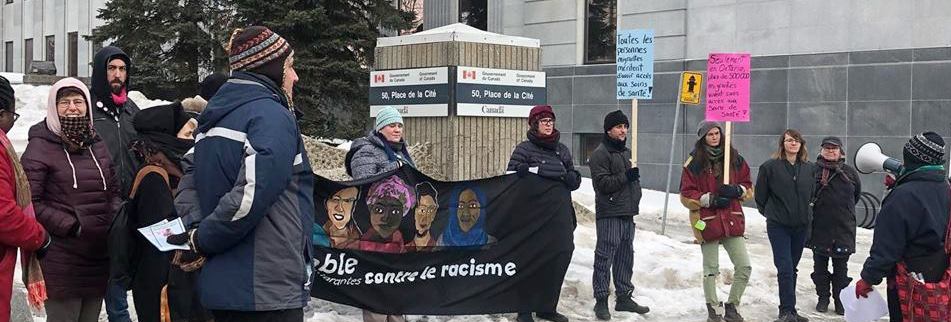
Montreal, QC

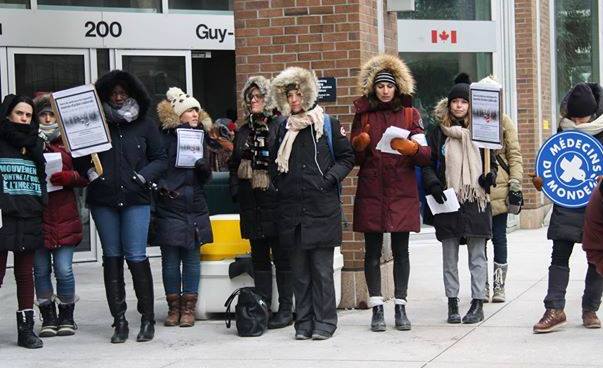 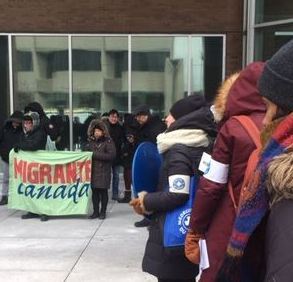
Toronto, ON

Saskatoon, SK

Edmonton, AB

 
Vancouver, BC

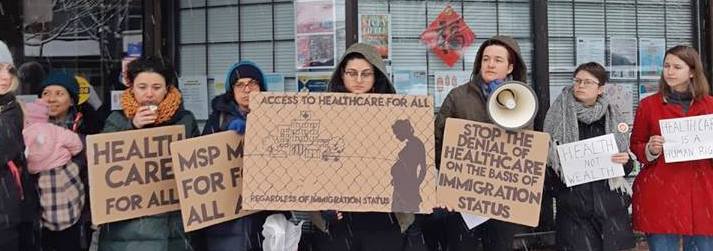

Condemn Canada's Support for
U.S.-Backed
Coup in Venezuela
- Canadian Union of Postal Workers
-

A Canadian delegation, including Don Foreman (2nd left) from the
Canadian Union of Postal Workers, participated as observers in
the
Venezuelan elections, May 2018.
CUPW condemns the Government of Canada's decision
to
recognize Venezuelan opposition leader Juan Guaidó as the
legitimate
president of Venezuela, over the elected president Nicolás
Maduro.
It is deeply disturbing that the Canadian
government
has chosen to support this U.S.-backed coup, which is in direct
violation
of international law. By following the U.S. agenda in Venezuela,
Canada
has aligned itself with the right-wing regimes of the Lima Group
and
Donald Trump, who resemble past U.S. governments who intervened
and
disrupted democratically elected governments in the Americas and
elsewhere in the world. This is unacceptable.
A Legitimate Government
Venezuelans created their Bolivarian Constitution
from
the ground up and have held several democratic elections.
Venezuelans
are capable of running their country without interference and
harassment from the United States and its allies, including
Canada.
Venezuela is currently facing economic
difficulties,
many a direct result of economic sanctions levied against
Venezuela by
the United States, in hopes of triggering a change in
government.
A Usurpation of the Power
On January 3, 2019, Venezuelan
opposition
leader Juan Guaidó swore himself in as interim president.
He was
quickly (and illegally) recognized by Canada, the U.S. and other
U.S.
allies. What is happening in Venezuela is a usurpation of the
democratic process.
The presidential elections of
May 20, 2018
were free, transparent, reliable, secure and in accordance with
the
law, according to observers from around the world, including a
CUPW
delegate, who traveled to Venezuela to observe the elections.
President Maduro won with nearly 67.84 per
cent of
the vote. None of the candidates who participated in the
electoral
process contested the results. Canada and the U.S. are claiming
that
the electoral process was not legitimate, despite assurances from
numerous observers that it was. What they are really saying is
that the
latest elections
did not garner the outcome they had hoped for.
In CUPW We Do Not Support U.S.-Backed Coup
d'États
Let us not be fooled. The U.S. support of this
coup is
about one thing: oil. Venezuela has the world's largest proven
oil
reserves and U.S. National Security Advisor John Bolton has
publicly
stated that the U.S. has a lot at stake in Venezuela's political
crisis, specifically citing the country's oil and the benefit it
could
bring to the U.S.
"It will make a big difference to the United
States
economically if we could have American oil companies really
invest in
and produce the oil capabilities in Venezuela," said Bolton.
We Support the Venezuelan People and the Postal
Workers

Mike Palecek, National President of CUPW,
speaking
at rally opposing Lima
Group meeting in Ottawa, February 4, 2019.
|
Meanwhile, Canada continues its relations with
horrific regimes like Saudi Arabia. CUPW maintains solidarity
with the
Venezuelan people and its postal workers. Under the Bolivarian
Constitution, Venezuelan government worker rights, health and
safety,
and rights to health care were vastly improved. We stand with our
sisters and brothers in their fight to protect their rights and
democracy
from foreign governments who are intent on dismantling them.
In Solidarity,
Mike Palecek National President

PREVIOUS
ISSUES | HOME
Website:
www.cpcml.ca
Email:
office@cpcml.ca
|








 The campaign began
after
the United Nations Human Rights
Committee (UNHRC) issued a decision in August 2018 condemning
Canada
for
denying access to essential health care on the basis of
immigration status. The decision specifically dealt with the case
of Nell Toussaint who was denied necessary health care because
she was undocumented. Nell is one of an estimated half
million people in Ontario alone who are denied access to health
coverage and care on this basis,
putting their health at risk.
The campaign began
after
the United Nations Human Rights
Committee (UNHRC) issued a decision in August 2018 condemning
Canada
for
denying access to essential health care on the basis of
immigration status. The decision specifically dealt with the case
of Nell Toussaint who was denied necessary health care because
she was undocumented. Nell is one of an estimated half
million people in Ontario alone who are denied access to health
coverage and care on this basis,
putting their health at risk.











